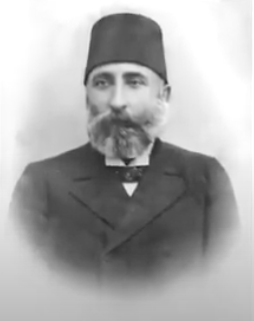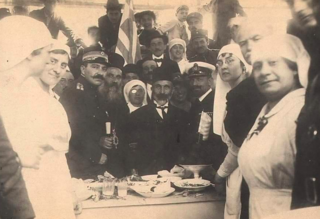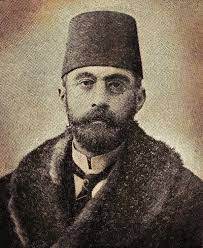Related Research Articles

Bedir Khan Beg was the last Kurdish Mîr and mütesellim of the Emirate of Botan.

Celadet Elî Bedirxan, also known as Mîr Celadet, was a Kurdish diplomat, writer, linguist, journalist and political activist. He held a master's degree in law from Istanbul University, completed his studies in Munich, and spoke several languages including Arabic, Kurdish, Russian, German, Turkish, Persian and French. He left Turkey in 1923 when the Kemalists declared a new republic. In 1927, at a Kurdish conference held in Beirut, a committee was formed, the Xoybûn. He is known for having been the first modern linguist to compile and organise the grammar of the modern form of the Northern Kurdish language, Kurmanji, and having designed the Latin-based Hawar alphabet, which is now the formal alphabet of Kurmanji and is also sometimes used for the other dialects of the Kurdish Language, having replaced the Arabic-based, Cyrillic-based, Persian-based and Armenian-based alphabets formerly used for Kurmanji.

Kurdistan was the first Kurdish newspaper. It was first published on April 22, 1898 in Cairo, Egypt by Mikdad Midhad Bedir Khan, a member of the Kürdistan Teali Cemiyeti. In four years, 31 issues were printed in cities as Cairo, Geneva, London and Folkestone. It was an opposition newspaper published in exile and supported by the Committee of Union and Progress and was published in Constantinople after the Young Turk revolution in 1908. It was often printed at CUP linked print shops which caused the newspaper to move to where ever the CUP had to establish itself anew due to the CUP's persecution by Ottoman ambassadors loyal to Sultan Abdülhamid.

Cizre is a city in the Cizre District of Şırnak Province in Turkey. It is located on the river Tigris by the Syria–Turkey border and close to the Iraq–Turkey border. Cizre is in the historical region of Upper Mesopotamia and the cultural region of Turkish Kurdistan. The city had a population of 130,916 in 2021.

Mehmed Şerif Pasha, a founding member of Kurd Society for Cooperation and Progress and representative of the Society for the Elevation of Kurdistan to the Paris Peace Conference (1919–1920). He was a leading Kurdish nationalist.

Bohtan was a medieval Kurdish principality in the Ottoman Empire centered on the town of Jazirah ibn 'Omar in southeastern Anatolia. The official religion of this principality was Yezidism in 14th century, although the rulers eventually converted to Islam, Bohtan constituted the third major Yezidi enclave after Shekhan and Sinjar until the 19th century.
Society for the Rise of Kurdistan also known as the Society for the Advancement of Kurdistan (SAK), was secretly established in Constantinople on 6 November 1917 and officially announced organization formed on the 17 December 1918. It was headquartered in Istanbul, with the aim of creating an independent Kurdish state in eastern Turkey. The Society based its statements for an independent or autonomous Kurdistan on the Treaty of Sèvres and the Fourteen Points stipulated by Woodrow Wilson. The society formed many local dependencies in the eastern provinces of Turkey.
Husni al-Barazi was a Syrian politician who served as prime minister.

Kamuran Ali Bedirxan was a Kurdish politician, lawyer and writer.

Hüseyin Vasıf Çınar (1895–1935) was a Turkish educator, politician, journalist and diplomat.

Mikdad Midhat Bedir Khan was a Kurdish nationalist and journalist who published the first ever Kurdish language newspaper, Kurdistan, in 1898. He was also a son of Bedir Khan Beg, the last Kurdish Mîr and mutesellim of the Emirate of Botan.

Emin Ali Bedir Khan was a founding member of the Kurd Society for Cooperation and Progress and vice president of the Society for the Elevation of Kurdistan and Kurdish politician.

Leyla Bedir Khan was a ballet dancer and a Kurdish princess of the Bedir Khan family.

Abdulkadir Ubeydullah was a President of the Kurdish Society for Cooperation and Progress (KTTC) and later the Society for the Rise of Kurdistan. He was a leading Kurdish intellectual and a once also a member of the Senate of the Ottoman Empire. He also took part in the uprising of Sheik Ubeydullah led by his father and was accused of having taken part in the Sheikh Said rebellion.

Süreyya Bedir Khan was a Kurdish prince, a descendant of Bedir Khan Beg and a member of the Bedir Khan family. He was an influent supporter of Kurdish independence, a journalist and author of several books. His works are also known under his pen-name Bletch Chirguh. Like other members of the Bedir Khan family, he claimed an ancestry to Khalid Ibn al-Walid, the Sword of Islam and general and companion of the Islamic prophet Muhammad.

Kurd Ahmet Izzet Pasha, also known as Kambur Ahmed İzzet Bey,, an Ottoman Kurd, governor and minister, was the son of Husein Pasha, half brother of Said Pasha Kurd and uncle of Şerif Pasha and Kurd Fuad Pasha.

Abdürrezzak Bedir Khan was an Ottoman Kurdish diplomat, politician and a member of the Bedir Khan family.

Mevlanzade Rifat Bey, was an Ottoman Kurdish journalist and poet.
Hasan Tahsin Pasha was an Ottoman bureaucrat and pasha. He served as First Secretary of Ottoman Sultan Abdulhamid II between 1894 and 1908.
Yezdanşêr was a Kurdish leader, military officer and a relative of Bedir Khan Beg. He became shortly the Müteselim of Cizre and later led a revolt against the Ottoman Empire in the mid 1850s. After the revolt failed, he was exiled to Vidin, returning to the Ottoman bureaucracy in 1860s.
References
- ↑ Henning, Barbara (2018). Narratives of the History of the Ottoman-Kurdish Bedirhani Family in Imperial and Post-Imperial Contexts: Continuities and Changes. University of Bamberg Press. p. 186. ISBN 978-3-86309-551-2.
- 1 2 Winter, Stefan (2006). "The other "Nahdah" The Bedirxans, the Millis, and the tribal roots of Kurdish nationalism in Syria". Oriente Moderno. 25 (86) (3): 465. ISSN 0030-5472. JSTOR 25818086.
- ↑ Henning, Barbara (2018), pp.186–187
- ↑ Henning, Barbara (2018), p.187
- ↑ Henning, Barbara (2018), pp.187–188
- ↑ Henning, Barbara (2018), p.188
- ↑ Henning, Barbara (2018), pp.188–189
- ↑ Özoğlu, Hasan (2004). Kurdish notables in the Ottoman Empire. State University of New York Press. p. 95. ISBN 9780791459935.
- ↑ Malmisanij, M. (2019). Akin, Salih; Blau, Joyce; Hellot, Florence; Mede, Hardy; Alsancakli, Sacha (eds.). Kamuran Ali Bedir Khan. Institute Kurde de Paris. p. 55.
- ↑ Henning, Barbara (2018), p.189